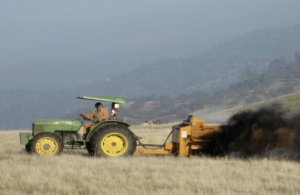Presented By: Ecology and Evolutionary Biology
EEB and the Institute for Global Change Biology Thursday Seminar: The long-term climate change mitigation potential of working lands
Whendee L. Silver, Professor of Ecosystem Ecology and Biogeochemistry and Rudy Grah Endowed Chair in Forestry and Sustainability, Department of Environmental Science, Policy, and Management, University of California Berkeley

Land management has been proposed as a means to help lower greenhouse gas emissions and reduce atmospheric carbon dioxide (CO2) concentrations. Research in California has shown significant potential to lower methane emissions from waste management and subsequently increase short-term soil carbon (C) storage via amendments of composted organic material. However, effective climate change mitigation will require long-term or sustained emissions reduction and C sequestration. We used field experiments and modeling to explore the long-term potential of improved agricultural practices on greenhouse gas emissions and ecosystem C cycling. A decade following a one-time application of composted organic matter to grassland soils, amended plots accumulated approximately 9 Mg C ha-1 more soil C in the top 30 cm than paired controls. Aboveground plant growth was also higher in the amended plots after 10 years. Soil C stocks and C sequestration rates in compost-amended plots were resistant to rainfall and temperature changes predicted by Earth Systems Models (ESMs). We used two climate models (HadGEM and CanESM) and two climate change scenarios (RCP 4.5 and RCP 8.5) to determine the sensitivity of rangeland C dynamics to climate change with and without composted amendments to the year 2100. Drier sites yielded surprisingly high rates of C storage and were less sensitive to climate change than wetter sites. We also used a new micrometeorological approach to estimate greenhouse gas fluxes from composted manure, green waste, and food waste, the highest emitting organic waste streams. We found that manure and green waste had considerably lower methane emission factors than food waste, and that all composted wastes had lower emission factors with composting than with landfilling or slurrying. Our results show that there are alternative management approaches can both lower greenhouse gas emissions and sequester atmospheric CO2 over short and long time periods, and thus provide viable climate change mitigation approaches.
View YouTube video of seminar: https://youtu.be/0JjEXOx9mQ8
View YouTube video of seminar: https://youtu.be/0JjEXOx9mQ8